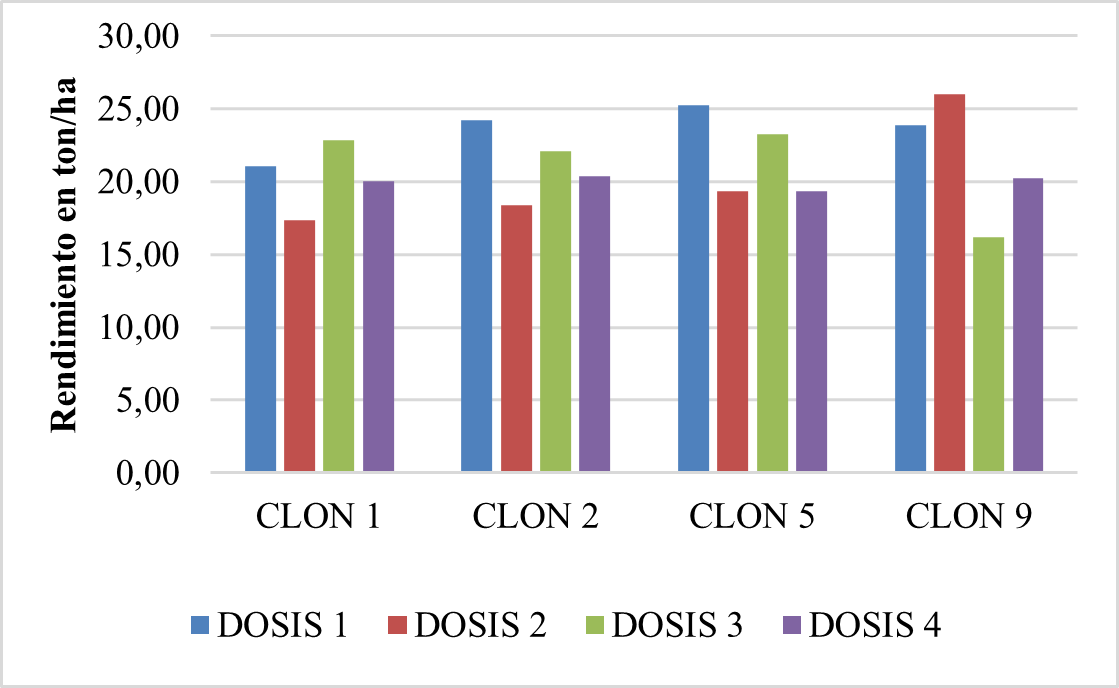Evaluación del efecto de la fertilización en el rendimiento de cuatro clones promisorios de papa criolla (Solanum phureja Juz. et. Buk) en Mutiscua, Norte de Santander
DOI:
https://doi.org/10.24054/cyta.v4i1.1072Palabras clave:
clones, fertilización, papa criolla, rendimiento, Solanum phurejaResumen
Este trabajo de investigación se realizó para evaluar el efecto de la fertilización en cuatro clones promisorios de papa criolla en el municipio de Mutiscua, la finca donde se ejecutó el estudio está ubicada a 2750 msnm y una temperatura promedio de 14 °C, los materiales se seleccionaron por el rendimiento superior en ensayos anteriores realizados en la zona, estos fueron el clon 2, 5, 9 y como testigo la variedad Colombia (Clon 1). Para determinar la dosis de fertilización se tuvo en cuenta el análisis de suelo, en base a los resultados se trabajó con cuatro dosis, la primera dosis recomendada por el agricultor, la segunda dosis: 50 % más que el análisis de suelo; la tercera dosis: a partir del análisis de suelo y la cuarta dosis: 25 % menos que el análisis de suelo; la aplicación del fertilizante se aplicó en el momento de la siembra y en el desyerbe. Se evaluaron variables morfológicas claves como la altura de planta, número de tallos, grosor y el área foliar, cuando el cultivo se encontraba en plena floración. En cuanto al rendimiento se evaluaron el número y peso de los tubérculos clasificándose en cuatro categorías cero, primera, segunda y riche. Se encontró que no hay diferencia significativa entre los clones evaluados, comportándose muy parecidos en cuanto al rendimiento, sin embargo, los clones que presentaron mayor rendimiento son el clon 5 con (21,76 t/ha) y el 9 con 21,59 t/ha. Para determinar la mejor dosis de fertilizante, se realizó un análisis de rentabilidad que identifica a la dosis 4 como la de mejor comportamiento con 207,87 %.
Descargas
Referencias
Agronet. (2014). Agronet Ministerio de Agricultura. Obtenido de: http://www.agronet.gov.co/estadistica/Paginas/default.aspx#
Cisneros, J. C. (2015). Evaluación del rendimiento agronómico de diez clones de papa criolla, (Solanum phureja, Juz et Buck L.) en el municipio de Mutiscua, Norte de Santander (2^da fase). Universidad de Pamplona, tesis de grado.
Fedepapa, F. C. (2014). EL cultivo de papa. Federación Colombiana del Cultivo de Papa, Recuperado el 21 de 06 de 2016 de: http:www.fedepapa.com/?page_id=401.
Gallo García, Y. M., Sierra Mejía, A., Donaire Segarra, L., Aranda, M., Gutiérrez Sánchez, P. A., y Marín Montoya, M. (2019). Coinfección natural de virus de ARN en cultivos de papa (Solanum tuberosum subsp. Andigena) en Antioquia (Colombia). Acta Biológica Colombiana, 24(3), 546-560. https://doi.org/10.15446/abc.v24n3.79277
Garcia, M. F. (2016) Comparación de diez clones de papa criolla (Solanum phureja, Just et Buck durante dos ciclos productivos en la vereda Chichira del municipio De Pamplona Norte De Santander. Universidad de Pamplona, Trabajo de grado.
Herreño, E. (2015). Evaluación de las características morfoagronómicas y de la producción de nueve clones nativos de papa criolla (Solanum phureja Juz et Buck L.). En el municipio de Mutiscua- Norte de Santander. (1ra FASE) Universidad de Pamplona, Trabajo de grado.
Sierra, M. A., Gallo, G., Estrada, A. M., Gutiérrez, P. A., y Marín, M. M. (2020). Detección molecular de seis virus de ARN en brotes de tubérculos de papa criolla (Solanum phureja) en Antioquia, Colombia. Bioagro, 32(1), 3-14. Recuperado a partir de: https://revistas.uclave.org/index.php/bioagro/article/view/2679.
Sierra, L., Suárez K., Villamil, J. y Alvarado, A. (2017). La Investigación en el cultivo de papa en la Universidad Pedagógica y Tecnológica de Colombia. Revista Respuestas. Obtenido de: https://dialnet.unirioja.es/servlet/articulo?codigo=6205729.
Vega D. (2015). Evaluación de la producción de papa criolla solanum phureja clon paisa en contenedores de polietileno de alta densidad bajo el marco de agricultura urbana. Revista Luna Azul. Obtenido de: https://revistasojs.ucaldas.edu.co/index.php/lunazul/article/view/1776

Descargas
Publicado
Número
Sección
Licencia
Derechos de autor 2019 Latorre Araque Carlos A., Villamizar Quiñones, César

Esta obra está bajo una licencia internacional Creative Commons Atribución-NoComercial-CompartirIgual 4.0.









